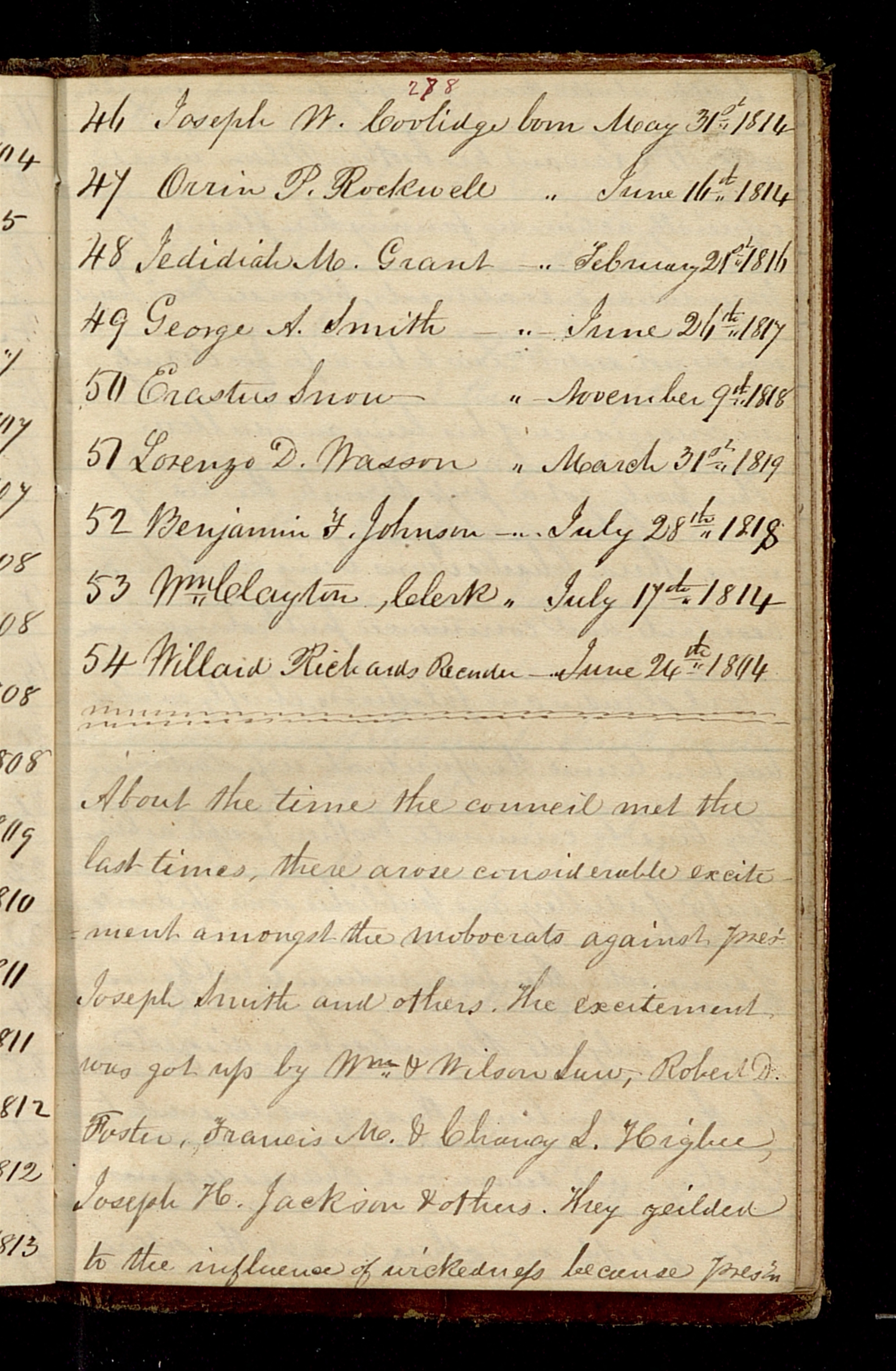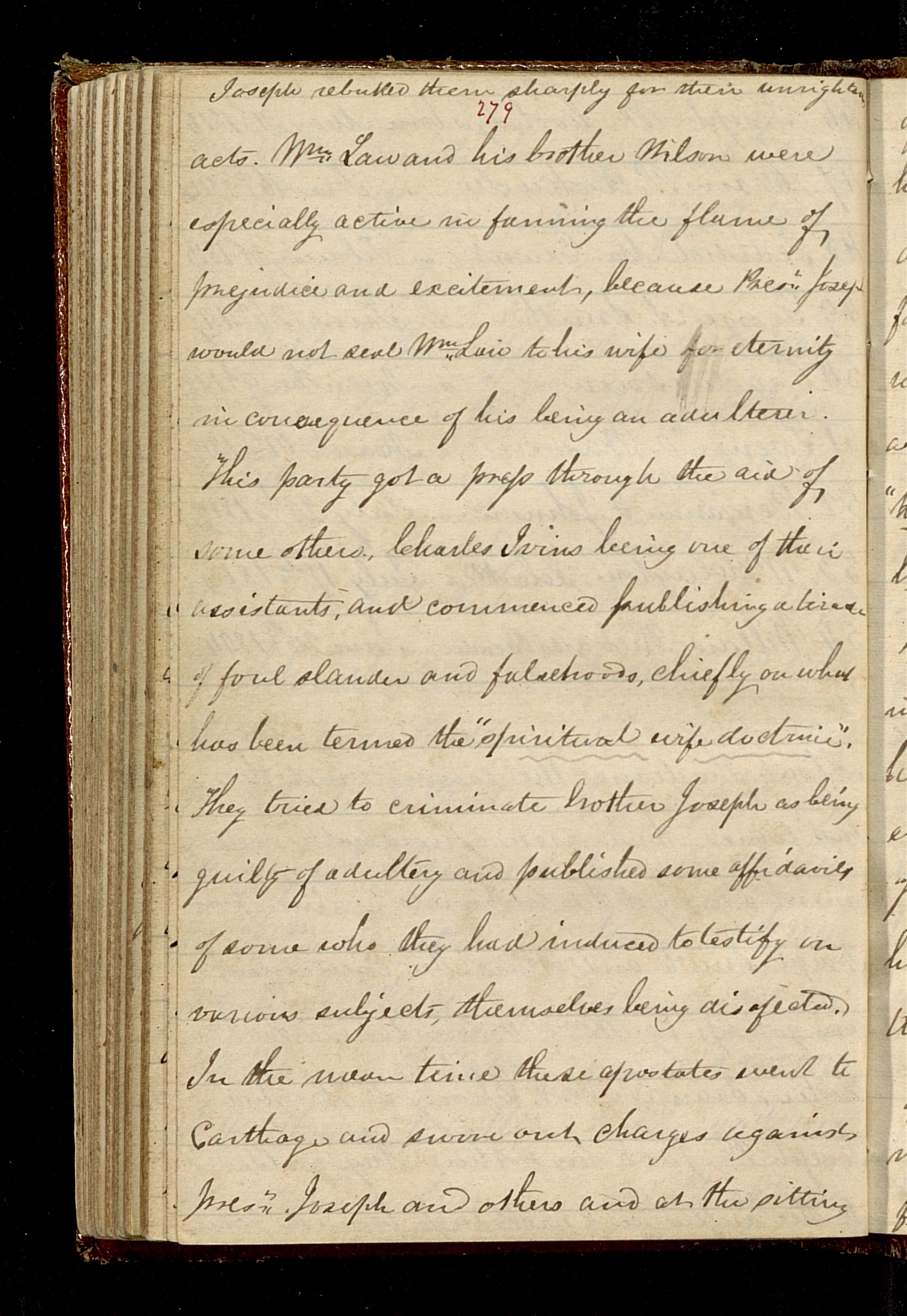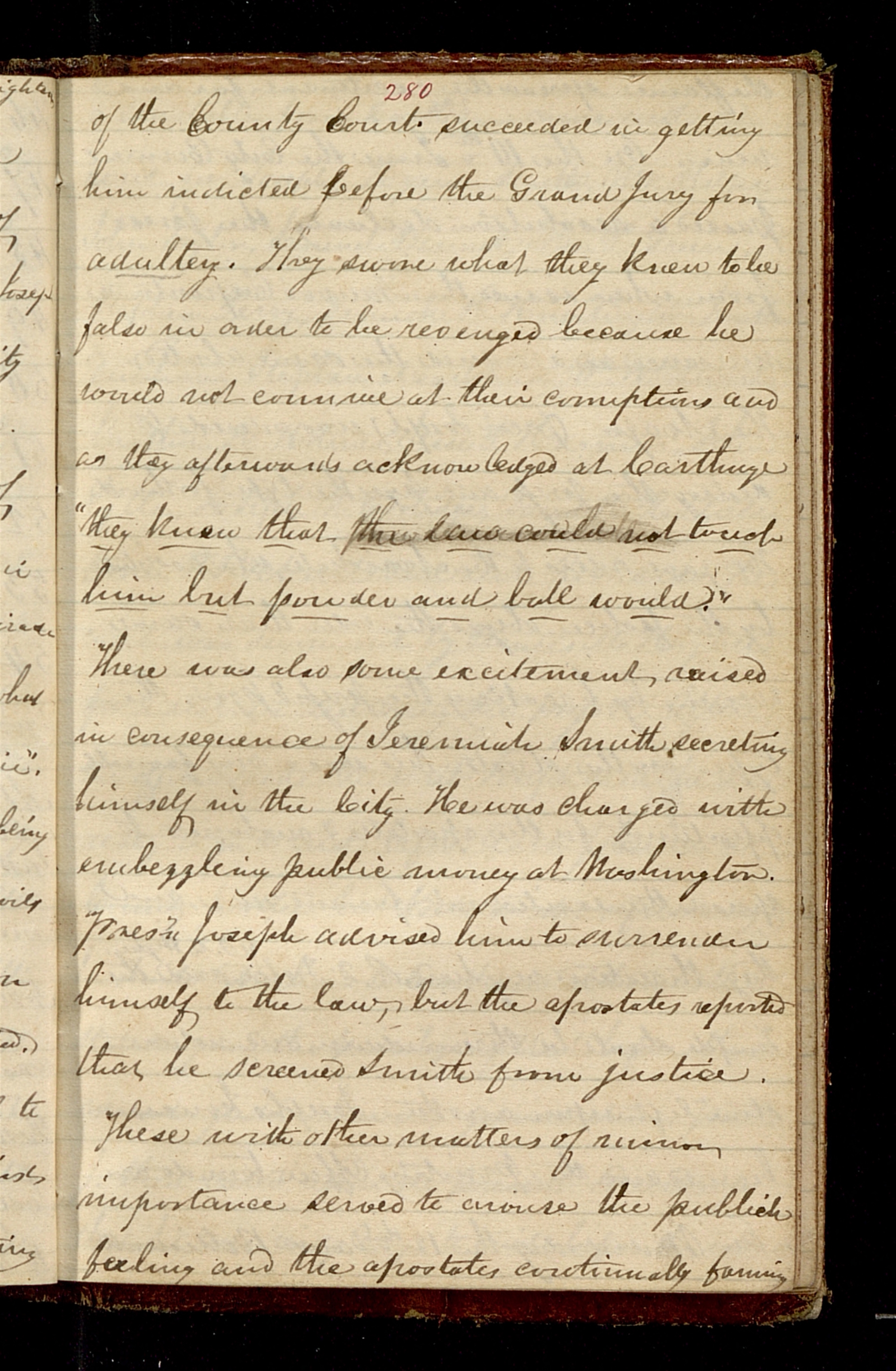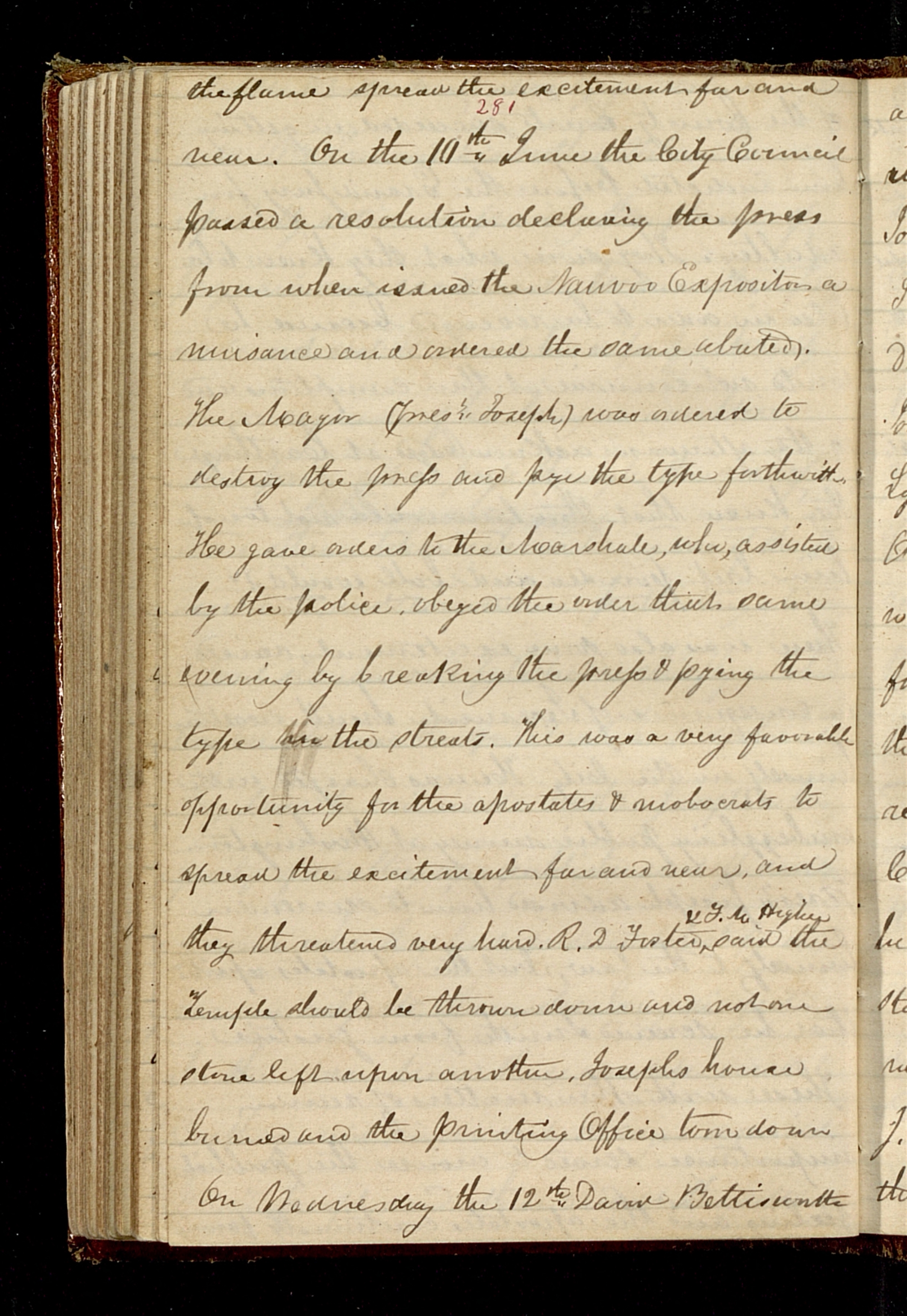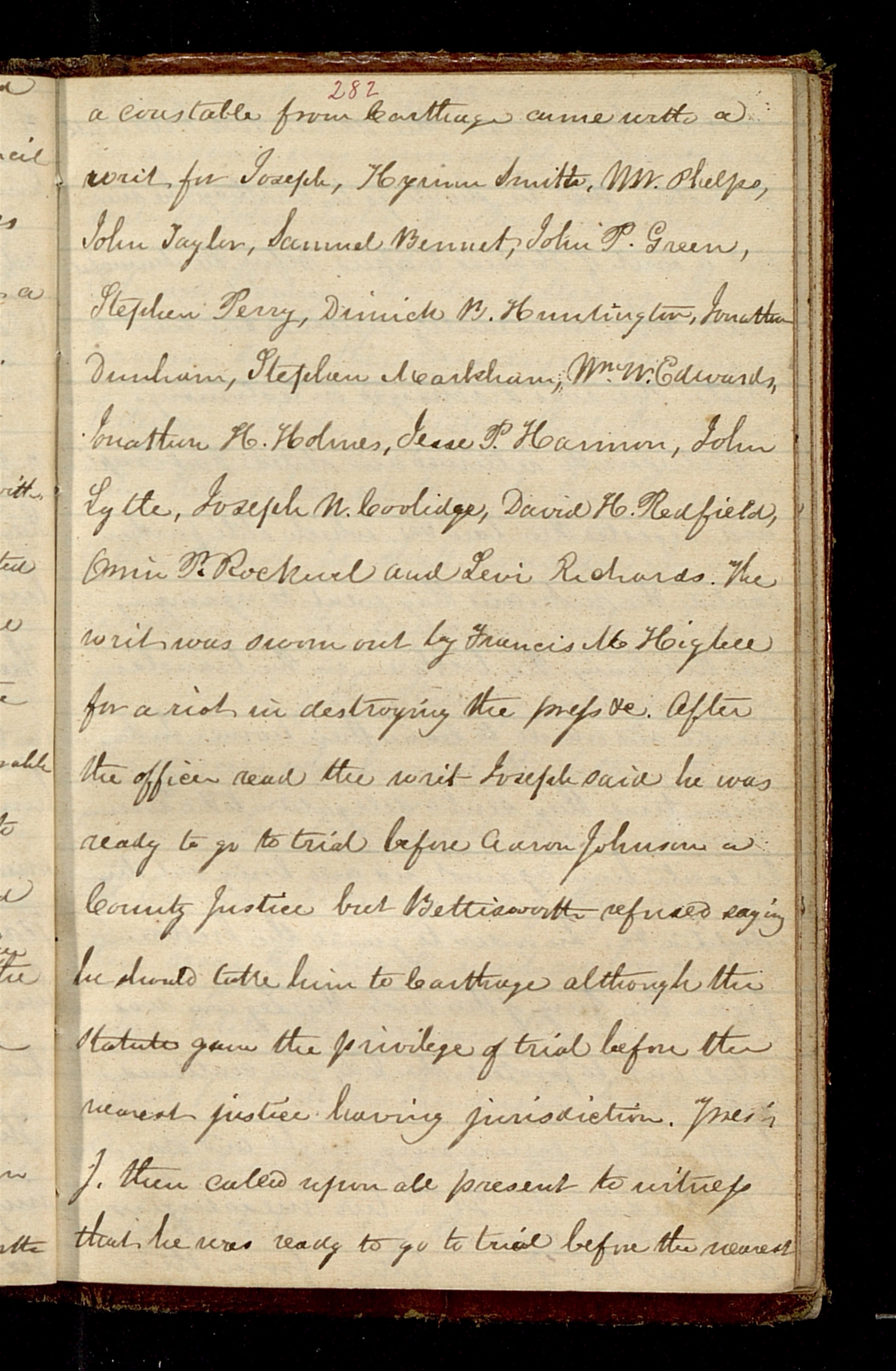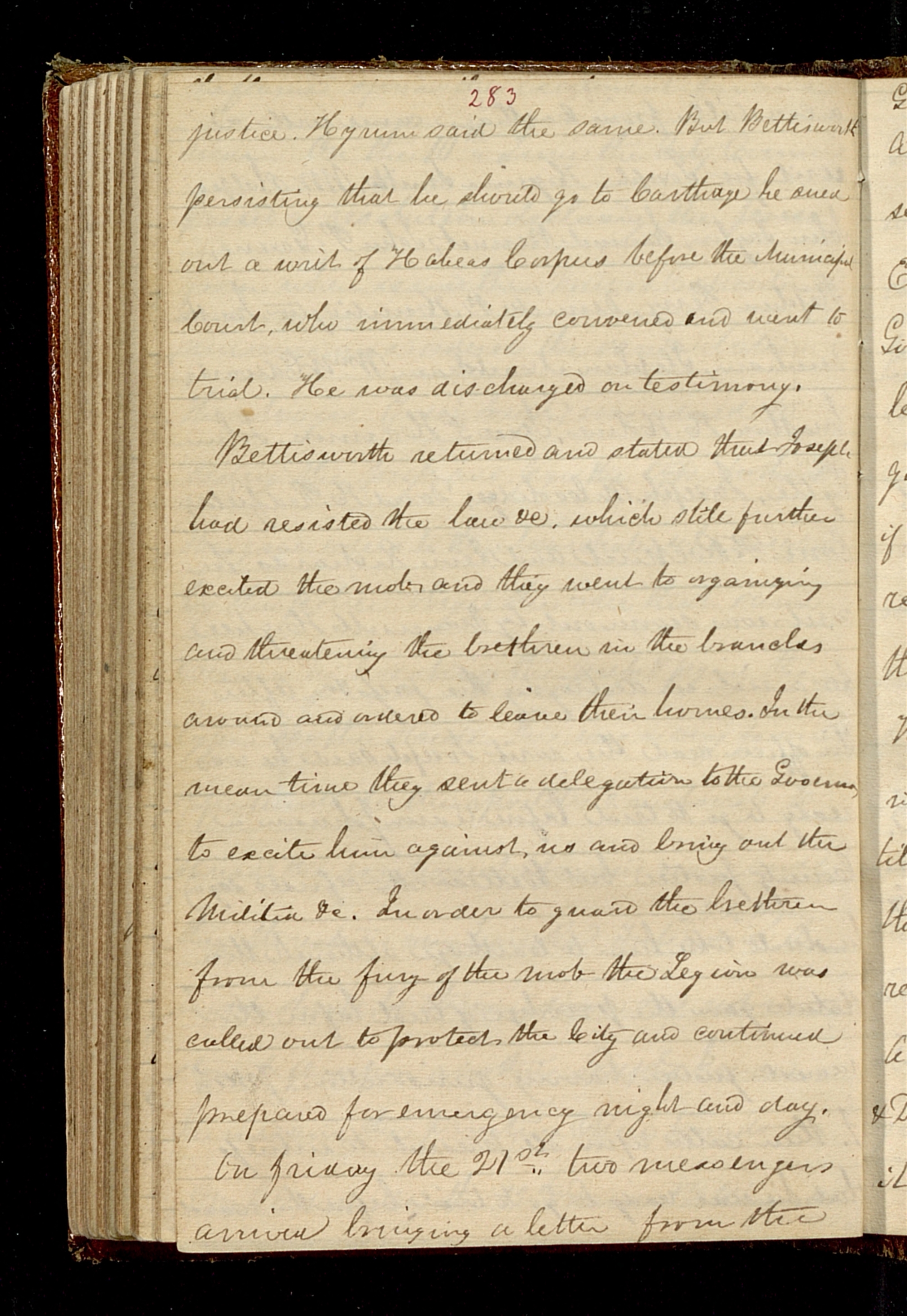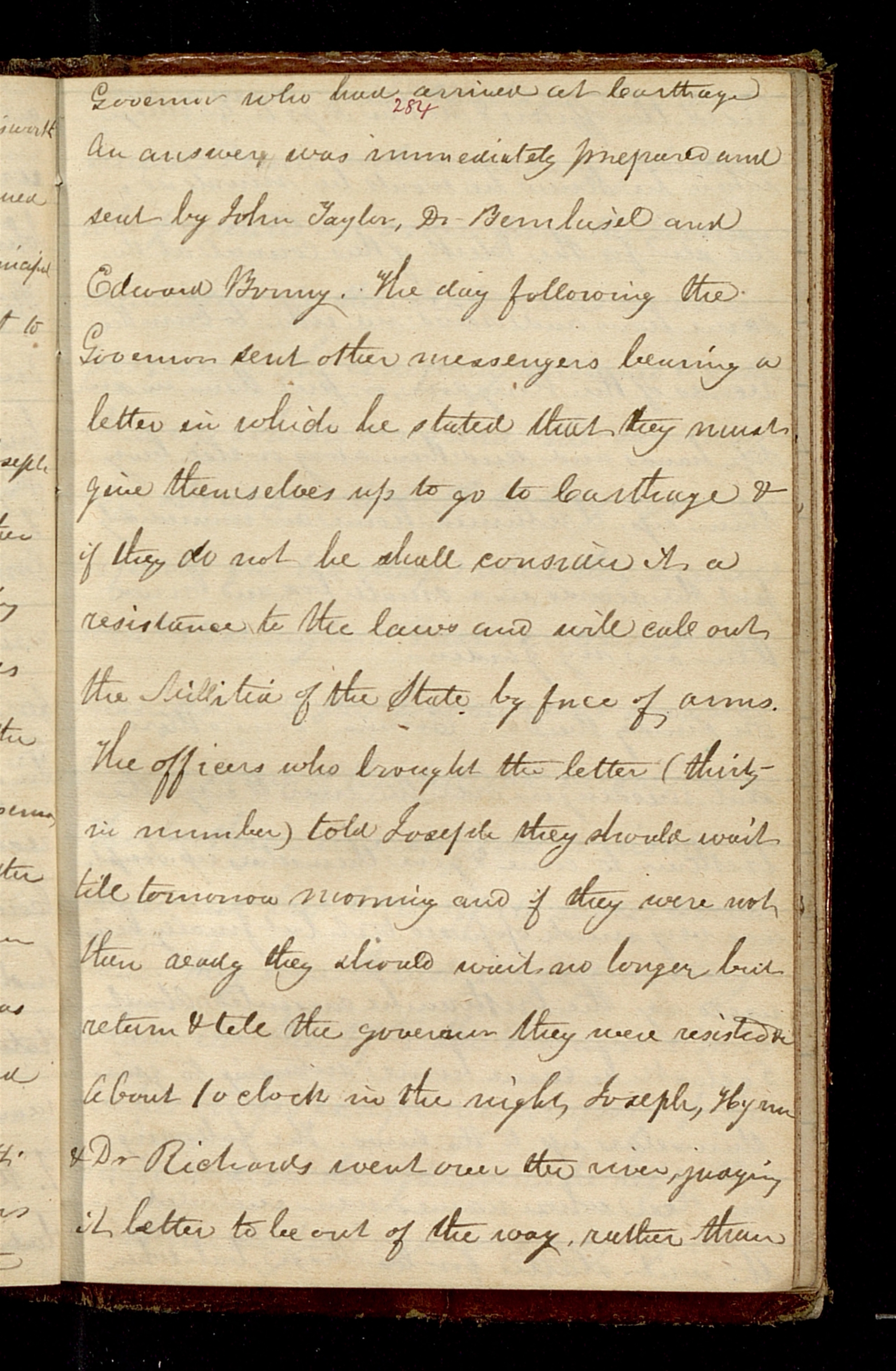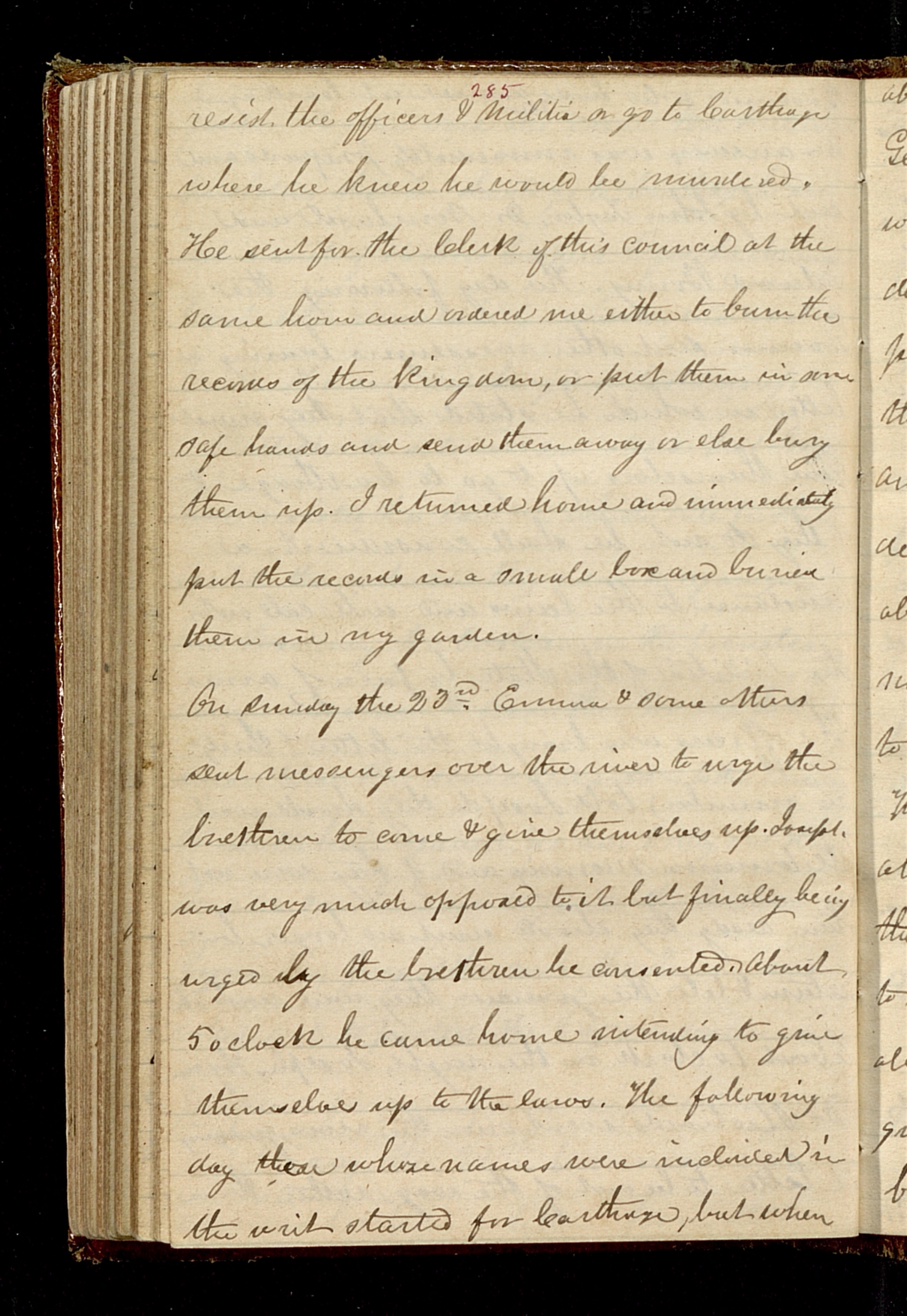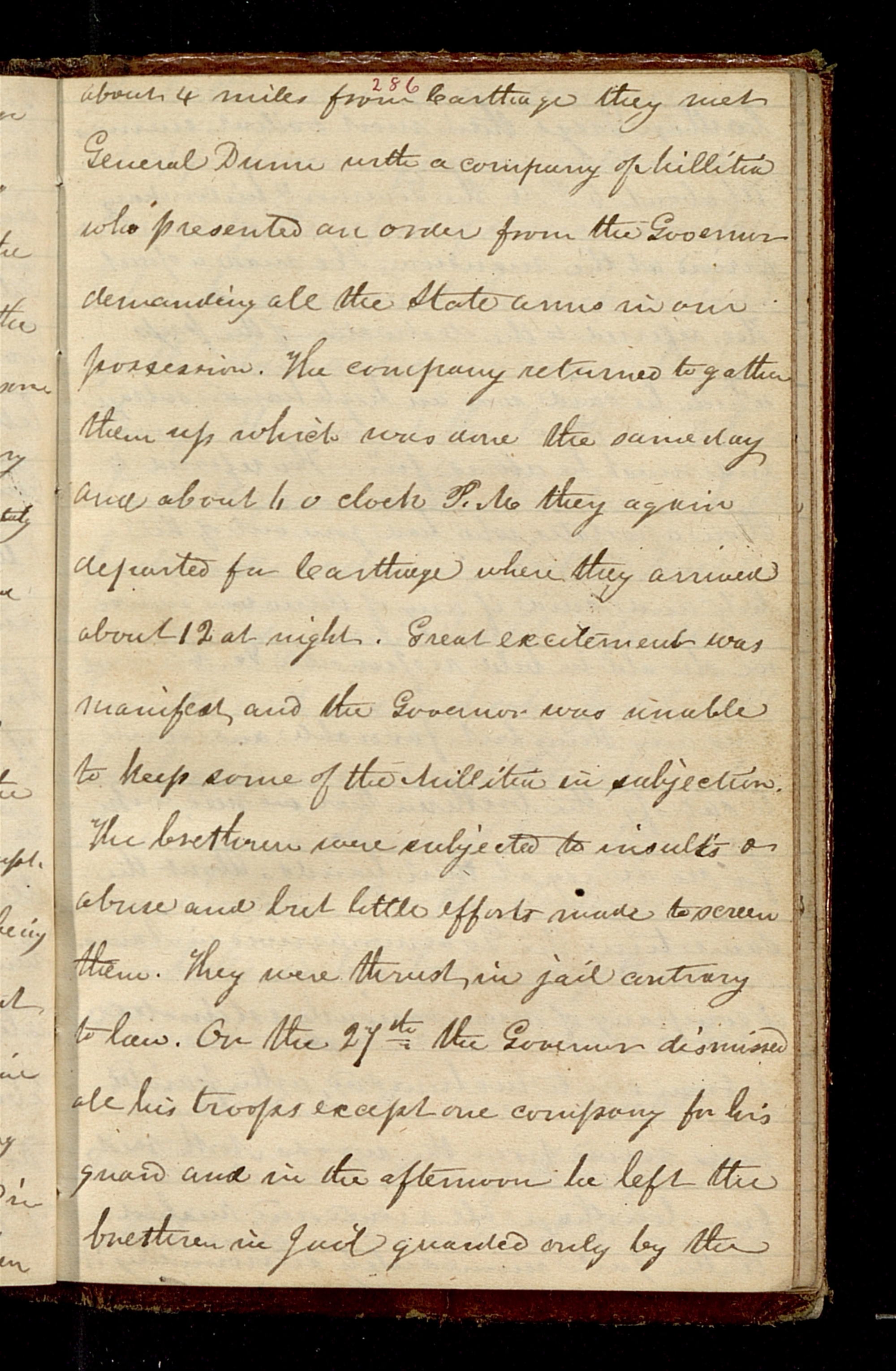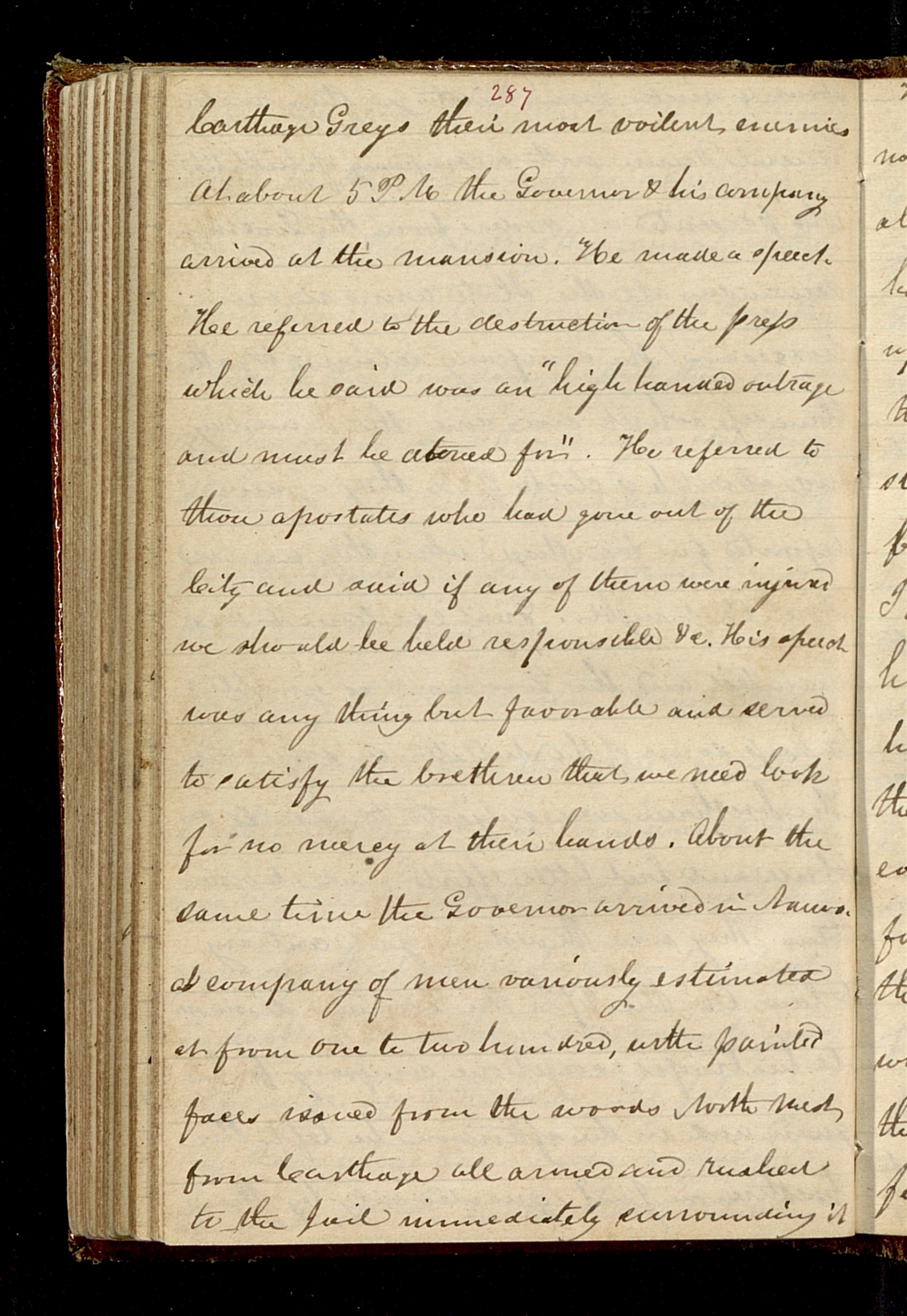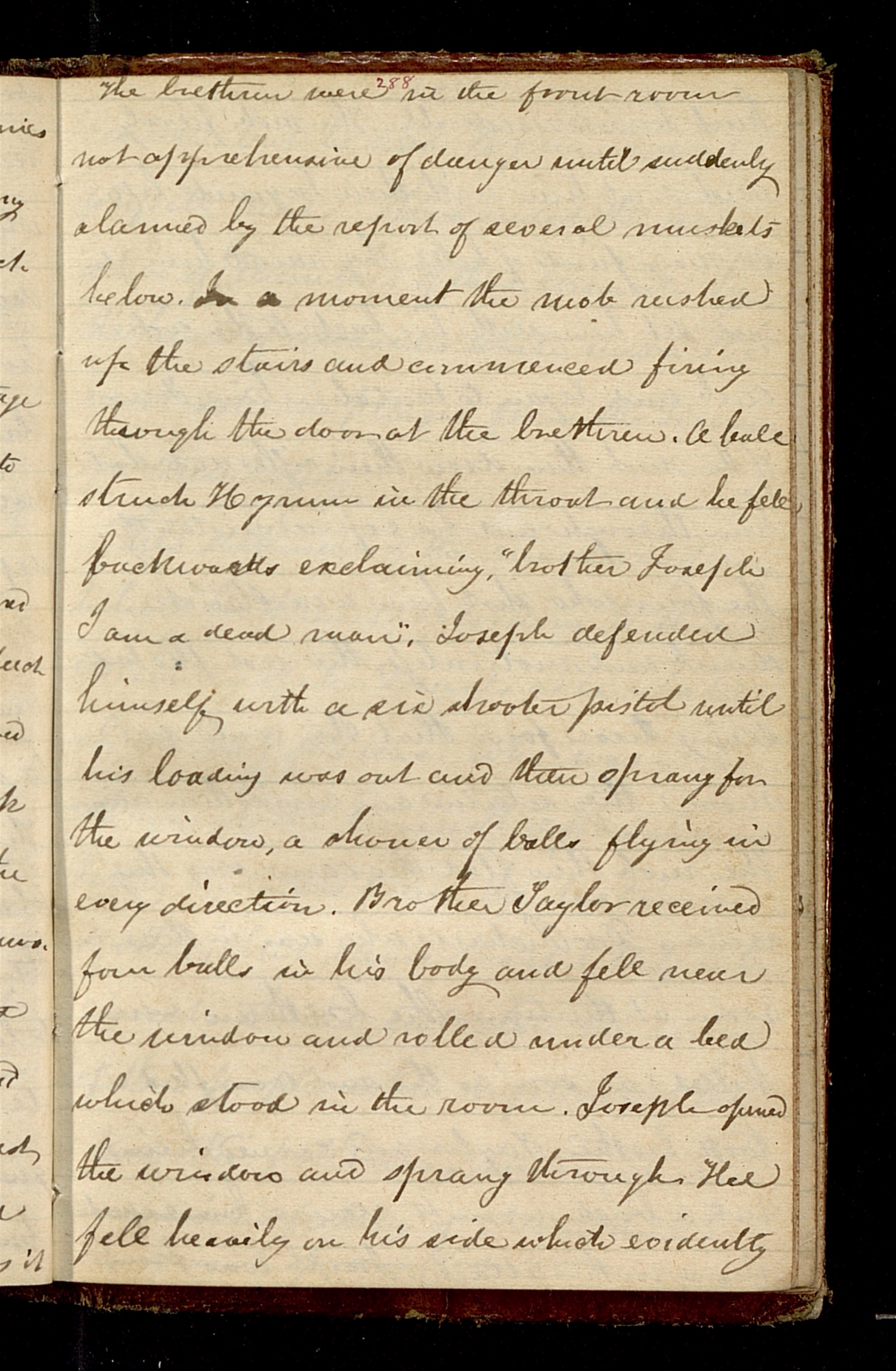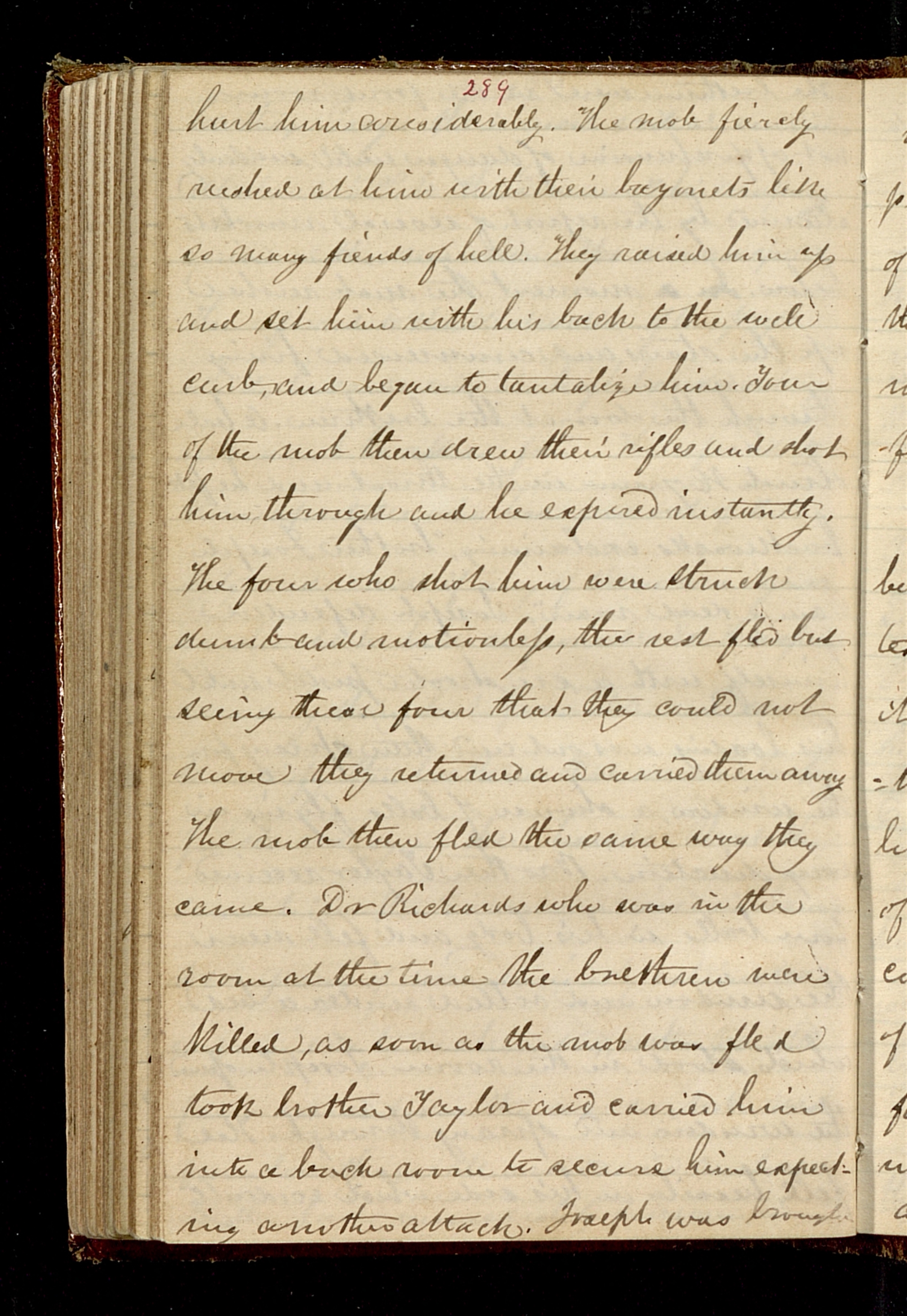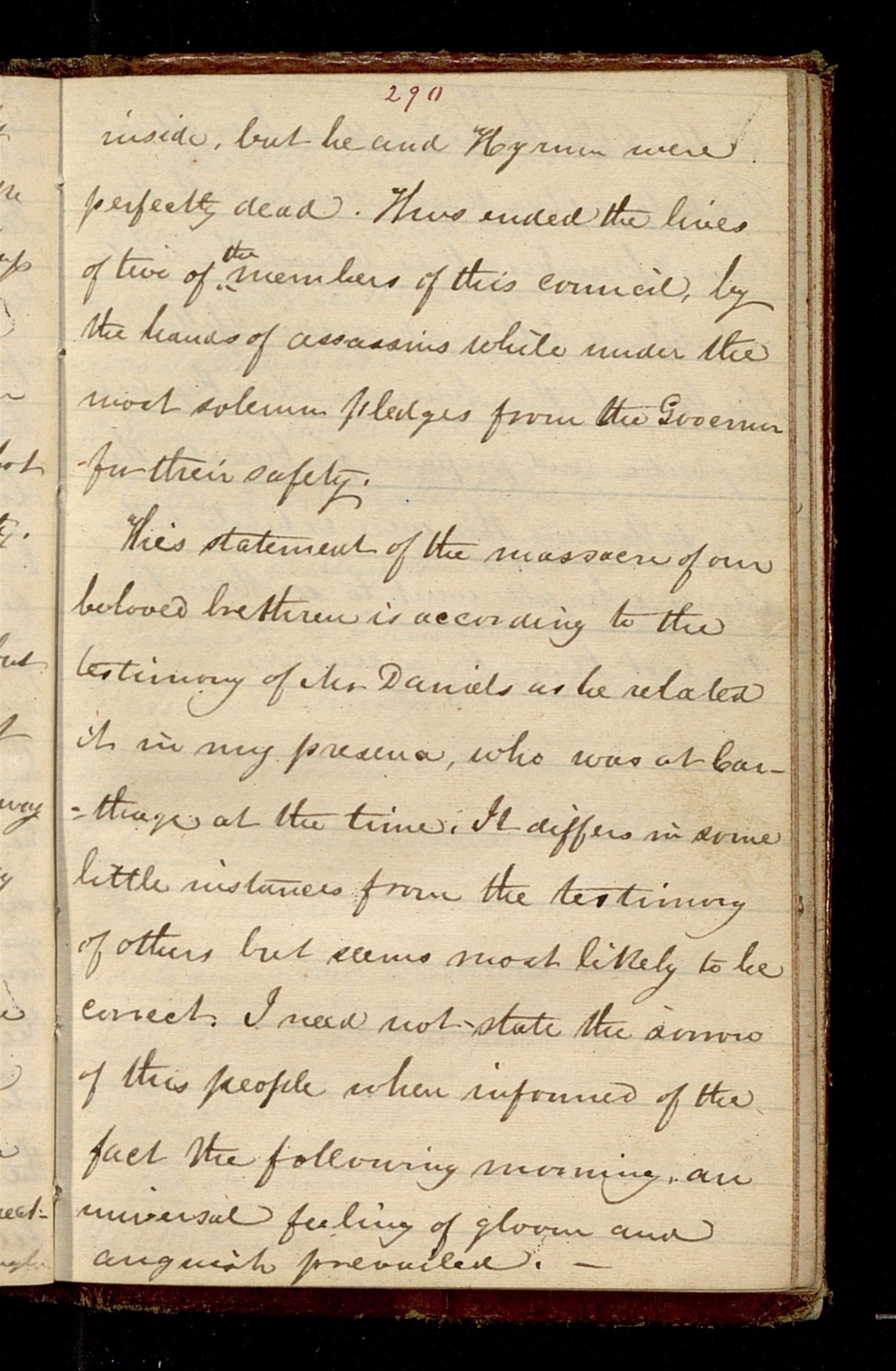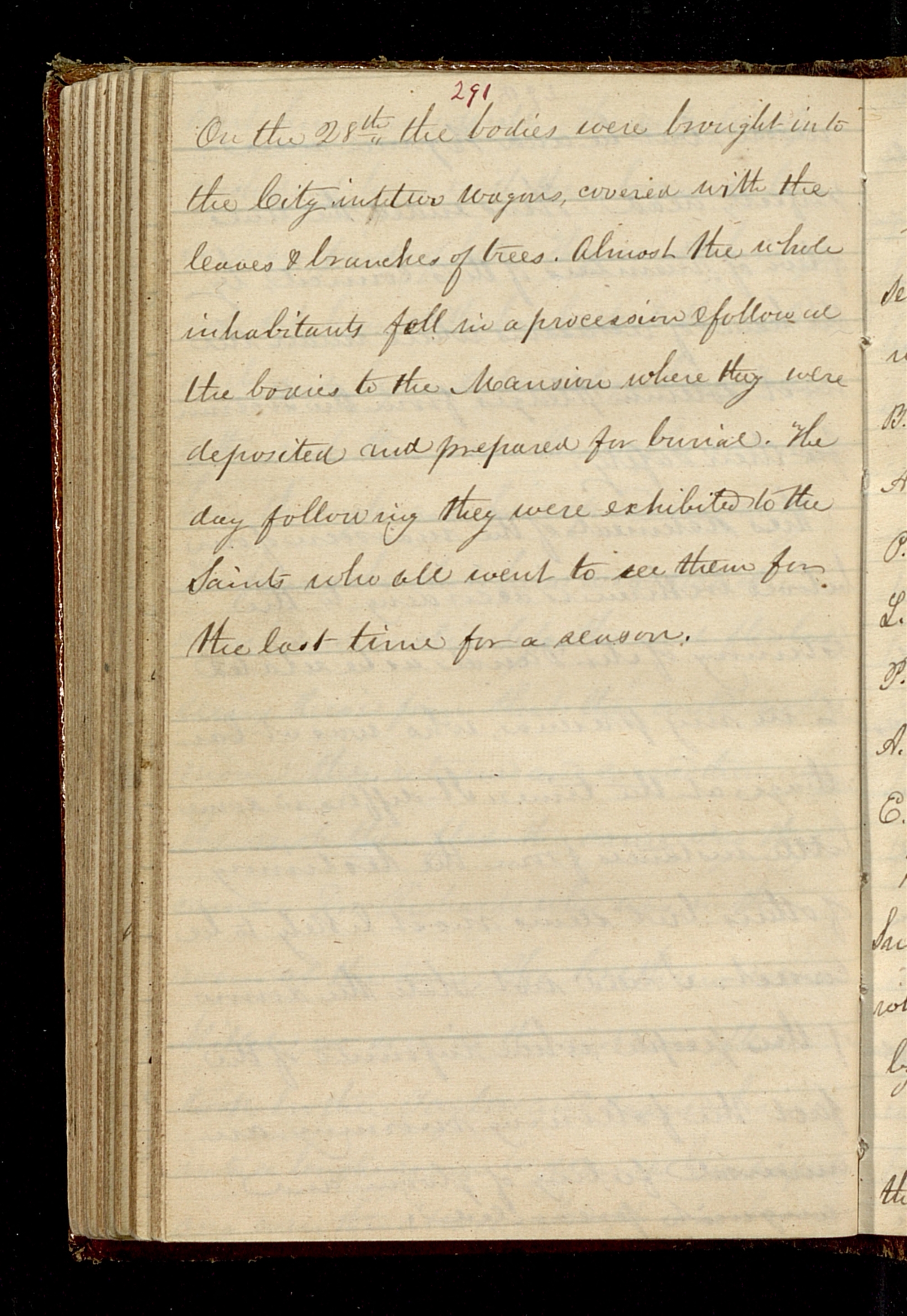William Clayton includes a summary of the events leading the Martyrdom in the Council of Fifty minutes.
- Type
- Meeting Minutes / Notes
- Hearsay
- Direct
- Reference
Council of Fifty, Minutes; Volume 1, February 1845, 289-301, The Joseph Smith Papers website, accessed January 17, 2022
- People
- W. W. Phelps, Aaron Johnson, Jonathan Harriman Holmes, Joseph W. Coolidge, Hyrum Smith, Wilson Law, John Portineus Greene, Jonathan Dunham, Emma Hale Smith, William Law, Levi Richards, Francis Higbee, William Clayton, Robert D. Foster, Nauvoo City Council, Samuel C. Bennett, John M. Bernhisel, Jane Silverthorn Law, John Taylor, Dimick B. Huntington, Chauncey Higbee, David Bettisworth, Charles Ivins, John Lytle, Joseph Smith, Jr., Edward Bonney, Stephen Markham, David H. Redfield, Thomas Ford, Jeremiah Smith, Willard Richards, Joseph H. Jackson, Stephen Chadwick Perry, Jesse P. Harmon, Orrin Porter Rockwell, James E. Dunn
- Audience
- N/A
- Transcription
About the time the council met the last times, there arose considerable excitement amongst the mobocrats against Prest. Joseph Smith and others. The excitement was got up by Wm. & Wilson Law, Robert D. Foster, Francis M. & Chancy S. [Chauncey L.] Higbee, Joseph H. Jackson & others. They yeilded to the influence of wickedness because Prest. Joseph rebuked them sharply for their unrighteous acts. Wm. Law and his brother Wilson were especially active in fanning the flame of prejudice and excitement, because Prest. Joseph would not seal Wm. Law to his wife for eternity in consequence of his being an adulterer.
This party got a press through the aid of some others, Charles Ivins being one of their assistants, and commenced publishing a tirade of foul slander and falsehoods, chiefly on what has been termed the “spiritual wife doctrine”.
They tried to criminate brother Joseph as being guilty of adultery and published some affidavits of some who they had induced to testify on various subjects, themselves being disafected. In the mean time these apostates went to Carthage and swore out charges against Prest. Joseph and others and at the sitting of the County Court succeeded in getting him indicted before the Grand Jury for adultery. They swore what they knew to be false in order to be revenged because he would not connive at their corruptions and as they afterwards acknowledged at Carthage “they knew that powder and ball the law could not touch him but powder and ball would.”
There was also some excitement raised in consequence of Jeremiah Smith secreting himself in the City. He was charged with embezzleing public money at Washington. Prest. Joseph advised him to surrender himself to the law, but the apostates reported that he screened [Jeremiah] Smith from justice.
These with other matters of minor importance served to arouse the publick feeling and the apostates continually fanning the flame spread the excitement far and near. On the 10th. June the City Council passed a resolution declaring the press from when[ce] issued the Nauvoo Expositor a nuisance and ordered the same abated. The Mayor (Prest. Joseph) was ordered to destroy the press and pye the type forthwith. He gave orders to the Marshall, who, assisted by the police, obeyed the order that same evening by breaking the press & pying the type in the streats. This was a very favorable opportunity for the apostates & mobocrats to spread the excitement far and near, and they threatened very hard. R. D Foster <& F. M. Higbee> said the Temple should be thrown down and not one stone left upon another, Josephs house burned and the printing Office torn down
On Wednesday the 12th. David Bettisworth a constable from Carthage came with a writ for Joseph, Hyrum Smith, W[illiam] W. Phelps, John Taylor, Samuel Bennet[t], John P. Green[e], Stephen Perry, Dimick B. Huntington, Jonathan Dunham, Stephen Markham, Wm. W. Edwards, Jonathon [Jonathan] H. Holmes, Jesse P. Harmon, John Lytle, Joseph W. Coolidge, David H. Redfield, Orrin P. Rockwel [Orrin Porter Rockwell] and Levi Richards. The writ was sworn out by Francis M Higbee for a riot in destroying the press &c. After the officer read the writ Joseph said he was ready to go to trial before Aaron Johnson a County Justice but Bettisworth refused saying he should take him to Carthage although the statute gave the privilege of trial before the nearest justice having jurisdiction. Prest. J. then called upon all present to witness that he was ready to go to trial before the nearest justice. Hyrum said the same. But Bettisworth persisting that he should go to Carthage he [JS] sued out a writ of Habeas Corpus before the Municipal Court, who immediately convened and went to trial. He was dis-charged on testimony.
Bettisworth returned and stated that Joseph had resisted the law &c. which still further excited the mob and they went to organizing and threatening the brethren in the branches around and ordered to leave their homes. In the mean time they sent a delegation to the Governor to excite him against us and bring out the Militia &c. In order to guard the brethren from the fury of the mob the Legion was called out to protect the City and continued prepared for emergency night and day.
On friday the 21st. two messengers arrived bringing a letter from the Governor who had arrived at Carthage An answers was immediately prepared and sent by John Taylor, Dr [John M.] Bernhisel and Edward Bonn[e]y. The day following the Governor sent other messengers bearing a letter in which he stated that they must give themselves up to go to Carthage & if they do not he shall consider it a resistance to the laws and will call out the Millitia of the State by force of arms.
The officers who brought the letter (thirty in number) told Joseph they should wait till tomorrow morning and if they were not then ready they should wait no longer but return & tell the governor they were resisted &c
About 1 o clock in the night Joseph, Hyrum & Dr [Willard] Richards went over the river, judging it better to be out of the way, rather than resist the officers & Militia or go to Carthage where he knew he would be murdered. He sent for the Clerk of this council at the same hour and ordered me either to burn the records of the kingdom, or put them in some safe hands and send them away or else bury them up. I returned home and immediately put the records in a small box and buried them in my garden.
On sunday the 23rd. Emma & some others sent messengers over the river to urge the brethren to come & give themselves up. Joseph was very much opposed to it but finally being urged by the brethren he consented. About 5 o clock he came home intending to give themselves up to the laws. The following day the those whose names were included in the writ started for Carthage, but when about 4 miles from Carthage they met General [James E.] Dunn with a company of Millitia who presented an order from the Governor demanding all the State arms in our possession. The company returned to gather them up which was done the same day and about 6 o clock P.M they again departed for Carthage where they arrived about 12 at night. Great excitement was manifest and the Governor was unable to keep some of the Millitia in subjection.
The brethren were subjected to insults or abuse and but little efforts made to screen them. They were thrust in jail contrary to law. On the 27th. the Governor dismissed all his troops except one company for his guard and in the afternoon he left the brethren in Jail guarded only by the Carthage Greys their most voilent enemies
At about 5 P.M the Governor & his company arrived at the mansion. He made a speech He referred to the destruction of the press which he said was an “high handed outrage and must be atoned for”. He referred to those apostates who had gone out of the City and said if any of them were injured we should be held responsible &c. His speech was any thing but favorable and served to satisfy the brethren that we need look for no mercy at their hands. About the same time the Governor arrived in Nauvoo, a company of men variously estimated at from one to two hundred, with painted faces issued from the woods North West from Carthage all armed and rushed to the Jail immediately surrounding it
The brethren were in the front room not apprehensive of danger until suddenly alarmed by the report of several muskets below. In a moment the mob rushed up the stairs and commenced firing through the door at the brethren. A ball struck Hyrum in the throat and he fell backwards exclaiming, “brother Joseph I am a dead man”. Joseph defended himself with a six shooter pistol until his loading was out and then sprang for the window, a shower of balls flying in every direction. Brother Taylor received four balls in his body and fell near the window and rolled under a bed which stood in the room. Joseph opened the window and sprang through. He fell heavily on his side which evidently hurt him considerably. The mob fiercly rushed at him with their bayonets like so many fiends of hell. They raised him up and set him with his back to the well curb and began to tantalize him. Four of the mob then drew their rifles and shot him through and he expired instantly. The four who shot him were struck dumb and motionless, the rest fled but seeing these four that they could not move they returned and carried them away The mob then fled the same way they came. Dr Richards who was in the room at the time the brethren were killed, as soon as the mob was fled took brother Taylor and carried him into a back room to secure him expecting another attack. Joseph was brought inside, but he and Hyrum were perfectly dead. Thus ended the lives of two of <the> members of this council, by the hands of assassins while under the most solemn pledges from the Governor for their safety.
This statement of the massacre of our beloved brethren is according to the testimony of Mr [William M.] Daniels as he related it in my presence, who was at Carthage at the time. It differs in some little instances from the testimony of others but seems most likely to be correct. I need not state the sorrow of this people when informed of the fact the following morning. an universal feeling of gloom and anguish prevailed.—
On the 28th. the bodies were brought in to the City into two wagons, covered with the leaves & branches of trees. Almost the whole inhabitants fell in a procession & followed the bodies to the Mansion where they were deposited and prepared for burial. The day following they were exhibited to the Saints who all went to see them for the last time for a season.
- Citations in Mormonr Qnas
The B. H. Roberts Foundation is not owned by, operated by, or affiliated with the Church of Jesus Christ of Latter-day Saints.

